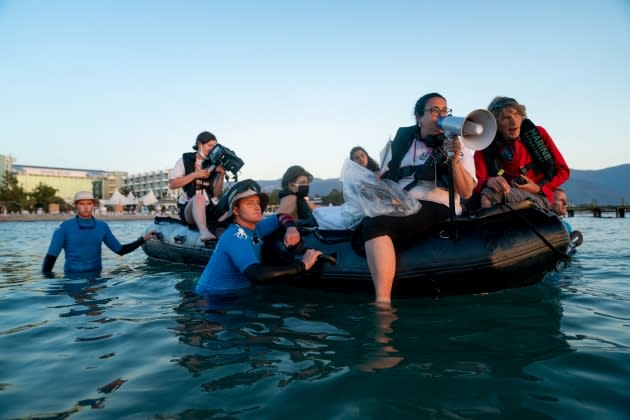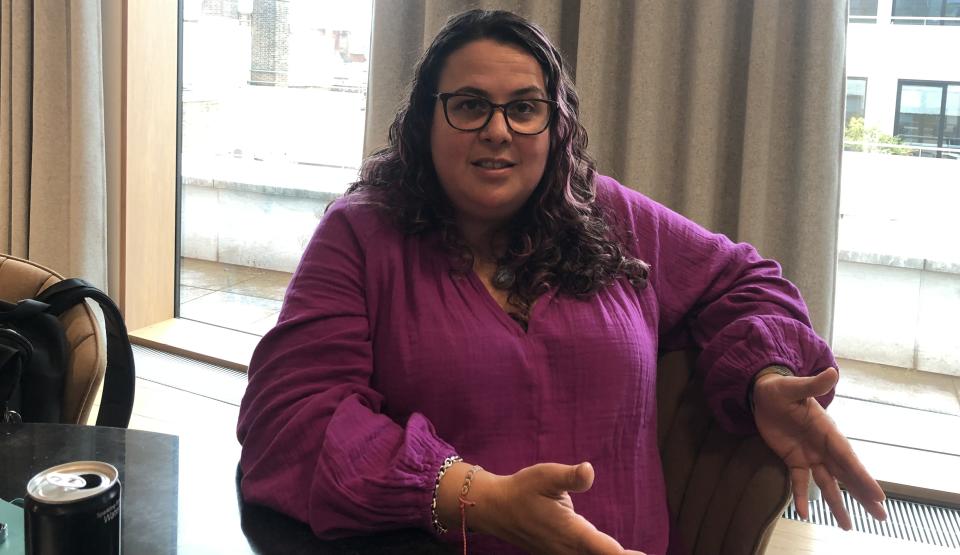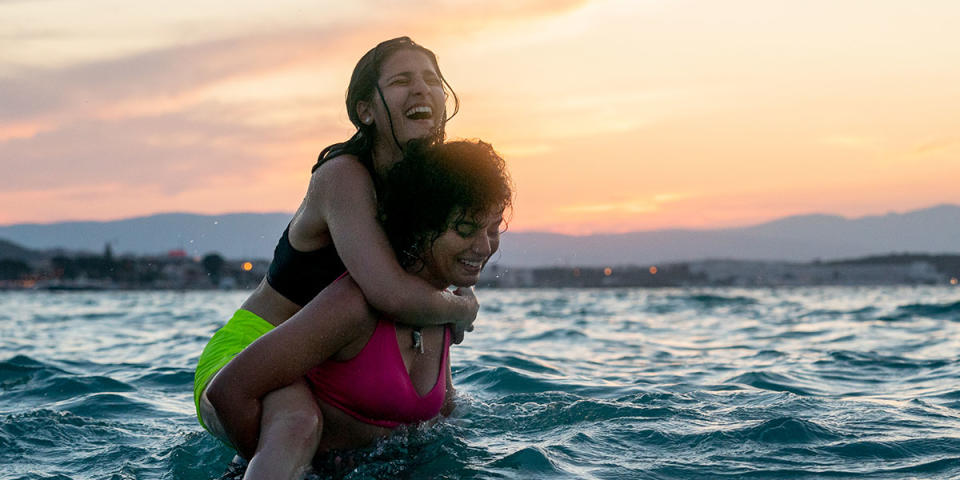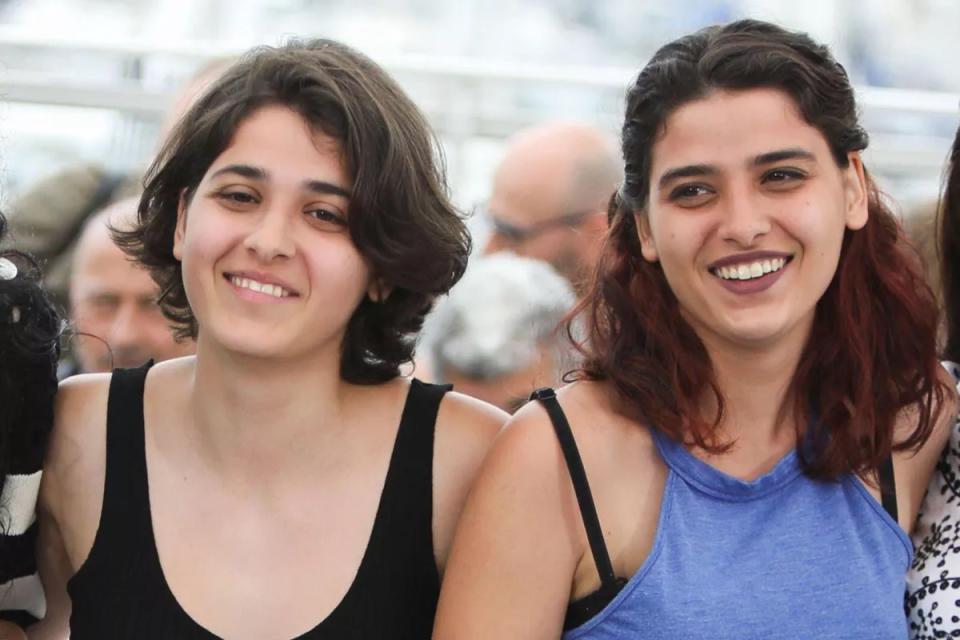Filmmaker Sally El Hosaini On Why She Decided To Make A Mighty Splash With ‘The Swimmers’ – Toronto Q&A
- Oops!Something went wrong.Please try again later.
- Oops!Something went wrong.Please try again later.
- Oops!Something went wrong.Please try again later.

EXCLUSIVE: Five days before filmmaker Sally El Hosaini (My Brother the Devil) was ready to declare “Action, background action” on the set of The Swimmers, the film fell apart due to the pandemic. “We just thought it was curtains for the film, which was heartbreaking,” the director recalled. “It just came to a halt, and there could be no promises of anything for anyone.”
The film, which opened the Toronto Film Festival on Thursday night, had been set up at Working Title with backing from Focus Features.
More from Deadline
‘The Swimmers’ Stars Manal & Nathalie Issa Said They Couldn’t Swim When They Were Cast - Toronto
The Exchange, DDL Entertainment Pact On Modern-Day 'La Dolce Vita' Series
San Sebastian To Screen Ulrich Siedl's 'Sparta' After Toronto Drops Film Over Der Spiegel Report
It already was a bit of a gamble before Covid reared its head. The story of two sisters, Yusra and Sarah Mardini — who left war-torn Syria to make a perilous journey across the Aegean Sea to Eastern Europe, and then, by hook or by crook, to make it to the 2016 Rio Olympics, where Yusra hoped to participate as a swimmer — was not an easy sell.
It’s a film with no stars, and half of its in Arabic.
The shutdown added millions to the budget and, perhaps understandably, Focus Features did not feel able to stay onboard.
However, Working Title’s co chairman, Eric Fellner, reached out to Netflix global film chief Scott Stuber to ask if he’d consider stepping into the breach. “I’ve got to genuinely big-up Scott,” Fellner told us, “because without his intervention, The Swimmers never would have happened. It would have been difficult to get the film back on its feet.”
Stuber asked Racheline Benveniste, Director of Original Film at Netflix, to collaborate with David Kosse, VP International Film at Netflix, on getting The Swimmers back into production.
Toronto Film Festival: Deadline’s Complete Coverage
“Scott did a great thing,” Fellner said admiringly.

Baz Bamigboye/Deadline
El Hosaini echoed Fellner’s gratitude. “Netflix came in, and I’ve got to say, they really allowed me to make the film that I wanted to make,” she said. “And, normally as a filmmaker, you’re fighting for authenticity … but they understood straight away things like, it opens and they all speak Arabic; they understood all of the things that I required to make it authentic. They care about that global audience, and there are new markets in the Middle East, and elsewhere in the world, and now they’re wise to the fact that they need to do things authentically for these people.”
El Hosaini continued that thought: “It’s just not good enough nowadays to watch a film and have one character speaking in an Egyptian accent, another in a Palestinian accent, another like a Gulf Arab, another like a North African Arab … you know, which we’ve had for so long,” she said.
The filmmaker is passionate about The Swimmers, and rightly so: It’s a terrific, heart-stopping drama. It wasn’t love at first sight, though.
“I’ve got to admit that when I first heard just the logline, I was like, ‘Hmmm, this is going to be that refugee-to-Olympian arc that we’ve seen a million times before.’ Then I saw that [screenwriter Jack Thorne] had done this very clever thing about making it about the two sisters. And I realized that there’s Sarah, this other sister who’s just as heroic as Yusra, and deserved to be on a pedestal, equally.”
However, first El Hosaini and casting director Shaheen Baig, had to find actors to portray the siblings. It took a year.
“The starting point was that I wanted to find Syrian sisters to play the roles, and so we were looking very much not just in Syria but the Syrian diaspora,” El Hosaini explained.
This meant that casting associates fanned out across the world — Canada, France, Germany, Syria — with Baig running the search from London.
But the Syrian women who came forward didn’t possess the appropriate documents. “We were in this awful situation,’ the director said. “We couldn’t get people who were halfway through their refugee status paperwork to go to Turkey, for example, or to come to the UK.”
Her aspiration was that they find native Arab speakers “because one of the things I insisted on was that they speak Arabic in the film” — and that the actors be able to swim, and act.
The casting search homed in on the Levant and countries neighboring Syria. “The Lebanese dialect is not too far from Syrian,” the director said. “Palestinian and Jordanian accents would work too, with some coaching”.
El Hosaini had Manal Issa (The Sea Ahead) on her mind when she first read the script, having seen her in a Lebanese film. “We reached out, but she didn’t want to audition because she couldn’t swim.
“As we continued searching, I kept remembering her,” El Hosaini told us.
“We got her to audition in the end. We were talking about sisterhood when Manal mentioned her sister, Nathalie, who was studying literature in Paris, doing her master’s” and noted that she’d had a couple of lines in a film but wasn’t an actor, she said.

Netflix
Nathalie was persuaded to join her sister in doing a screen test. “I saw the sisterly chemistry between them then, and it was just a no-brainier for me,” El Hosaini remembered thinking.
Slight problem. Neither could swim.
‘The Swimmers’ Stars Manal & Nathalie Issa Said They Couldn’t Swim When They Were Cast – Toronto
“We spent a few months of swim training every day — working out, nutrition plans. They were really committed to it, but there was no way that we were going to get them to a level where they could swim the butterfly stroke to an Olympic standard.”
They ended up using doubles for some of that swimming, with the real Yusra doubling Nathalie playing herself. “How’s that for meta?’ El Hosaini asked.
Originally, Stephen Daldry had been attached to direct. Fellner told Deadline: “I think Stephen realized that he might not be the best director for it and that we should hire a female director, and also somebody who spoke Arabic. So he moved into an executive producer position, and we were lucky enough to meet Sally, and she and Jack worked on the script. We got the film greenlit by Focus. We were all happy — and five days before we started shooting, Covid happened.”
Here’s what El Hosaini shared with Deadline about making The Swimmers:
DEADLINE: The film has touches of irreverence that I’m pleasantly surprised to find in a film that’s partly set in the Middle East, made by a Western studio.
SALLY EL HOSAINI: I was able to be a bit more irreverent, I was able to capture some of their banter and … I just think you become very aware, when you’re not from somewhere of being very respectful, which is fantastic. … But I felt like it needed to be roughed up a little bit, in terms of the sisters and in terms of who Yusra and Sarah really are and in terms of making the family less conservative as they first appeared because they aren’t that way. For instance, the parents were comfortable having their daughters wear swimsuits around me.
If I’m taking that horrific journey with my sibling, the way I’m going to get through it is by having a sense of humor about it. That’s true to them, Yusra and Sarah, and true to life.

DEADLINE: You soon realize that this isn’t going to be a routine sports drama when a bomb shell clatters to the bottom of a swimming pool. That set the heart racing.
EL HOSAINI: That was shot in Turkey at the university swimming pool in Istanbul. We did a lot of shooting in Turkey — in Istanbul and all along the Aegean coast. Essentially, most of it is a roads movie, so we as a production are constantly on the road moving from location to location everyday, only ever anywhere for one day.
DEADLINE: Their everyday life involved snipers, bombs, and I was struck by how you present that situation so matter-of-factly; it’s an everyday occurrence.
EL HOSAINI: Which was very true as to how the conflict reached Damascus because it wasn’t what we’ve come to expect of Syria through the images of bombed-out Homs or Aleppo or the news images we see. It’s not like the palette is beige. Damascus in 2015, I mean the girls had iPhones. This is a vibrant, modern city with young, modern inhabitants living a lifestyle that we wouldn’t recognize in the West: eating fast food, going to KFC, going to school, training, nightclubs and bars. Vice did a great piece on the bars in Damascus because so many new bars and underground bars in that old city like sprung up during the conflict because people needed drink even more than normal. Anyone who has been to any of the big Middle East cities knows that … what you see in The Swimmers, you can see in Cairo, you can see in Dubai, you can see it in these cities. It’s just that you don’t often see it in our cinema screens.
DEADLINE: But you ensured that we did.
EL HOSAINI: The chance to show that really excited me — like who Yusra and Sarah were, portraying them honestly and authentically, seeing that in them was the opportunity to show young Arab women in a way that I hadn’t seen them yet, and in a way that I feel is so universal. And so my hope was that an audience was very much on the journey with them rather than an objective observer watching them go on that journey. … I worked with Chris Ross, who’s the cinematographer, and our starting point was: What is the most opposite to the news images we’ve seen of these people? And that was our ethos; we no longer want to be an observer sitting at home looking at Syria on the news where we can easily turn the channel because we’ve become immune to those images. You see a dingy, you see life jackets, you turn the channel to forget about it, slightly … you know, that’s over there. But you change all of that, and you present this world where you’re on the inside with them. I’m them and I’m going with them. That was the aspiration for the whole film.
DEADLINE: Tell me about the search for actors to portray the sisters?
EL HOSAINI: I worked with [casting director] Shaheen Baig. It was a long process. We took over a year to cast the sisters. The starting point was I wanted to find Syrian sisters to play the roles, and so we were looking very much not just in Syria but the Syrian diaspora. So we had casting associates in so many cities around the world. Shaheen was running it from London, but we had people in Canada, we had people in Germany, in Paris, in the Middle East, in Syria helping us. Boots on the ground. In the end, we saw like 200 girls. The Syrian young women we were interested in, unfortunately, didn’t have the paperwork, so we were in this awful situation where the places we needed to film the film — which ended up being the UK, Brussels for the water tank and Turkey, for the majority of the film — we couldn’t get people who were halfway through their refugee status paperwork to go to Turkey, for example, or to come to the UK, and we were suddenly in this paperwork bind because of their status and it became complicated. My aspiration was that they were native Arab speakers because one of the things I insisted on was that they speak Arabic in the film, certainly in the beginning [of the film]. I really wanted them to be presented as they really are, which is totally bilingual. So the search for native Arabic speakers who could swim, who could act — obviously acting came first. So then we homed in on the Levant, then look at the neighboring countries to Syria to start with. The Lebanese dialect is not too far from Syrian. Palestine, Jordan, where it’s the same type as Arabic. There’s still accent work to be done, but it’s the type of Arabic that is from that same school. North African Arabic, for example, is just a non-starter; it’s totally different, and it would be learning a new language for somebody.
So then we homed in there … and interestingly, I had thought of Manal Issa [to play the older sister], when I first read the script because I’d seen her in a Lebanese independent film. We reached out to her, but she didn’t want to audition because she couldn’t swim. As we were searching I kept remembering her and, you know, I thought we really need to get her to come in. We got her to audition in the end. When I met her we were talking about sisterhood, and she started taking about her own sister, who was studying literature in Paris, doing her master’s and had a very small part, just a couple of sentences, in a film that she’d done a little while ago. But she wasn’t an actress. So I was like, “Oh, very interesting.” And so we convinced Nathalie and then they both come over to screen-test. And when I saw the sisterly chemistry between them, it was just a no-brainier for me.
DEADLINE: Could Nathalie swim?
EL HOSAINI: Neither of them could. So we then taught them.
DEADLINE: How long did that take?
EL HOSAINI: We spent a few months of swim training every day, working out every day, nutrition plans. They were really committed to it, but there was no way we were going to get them to a level where they could swim to an Olympic standard, so we ended using doubles for some that swimming. So the real Yusra doubled Nathalie playing herself.
DEADLINE: Aha.
EL HOSAINI: How’s that for meta?
DEADLINE: Where did those preparations take place?
EL HOSAINI: That was in the UK. We brought them here, and we were prepping here and we did some of our initial shooting in London. Then we all went out to Turkey, did the bulk of the film out in Turkey, and then at the very end we went to the water tank in Brussels.
DEADLINE: Did you go in the water?
EL HOSAINI: Of course. We were all in the water. We did as much of that crossing for real as we could, so we put the dinghy in the Aegean Sea and we filmed it for real. Next to that dinghy is the camera boat that I’m on with [cinematographer Christopher Ross]m just taking those waves the same as way as everyone else.
I cast some Syrian refugees as well in that group on the dinghy because they’d taken the same journey themselves. There were some Syrian refugees involved in the production on the crew as well, who’d also taken the same journey.
DEADLINE: What was the psychological impact on the refugees, sort of having to relive that experience again, albeit safely?
EL HOSAINI: We discussed that a lot in advance, and everybody really wanted to do it and was up for that. They understood, as well, what I was trying to do with the film in terms of allowing a channel-switching audience to actually emphasize and to be on the journey and see it through their eyes. It brought a tone to filming, and to the set, where, at times, it got very emotional. But there was just this bond that happened. We had two days on open water, to do the daytime crossing. After the first day there was just this crazy bond from that group of people. The hugs, the tears, the connection that people had through having experienced just a little bit of it. Because when they’re vomiting in the film, they’re really vomiting in real life. All the daytime stuff is real.
DEADLINE: How were the nighttime water scenes shoot?
EL HOSAINI: It was too dangerous to be in the sea at night, the Aegean is unpredictable. The marine team were incredible. We had the safety requirements, but just too dangerous to do that at night in the sea. We were in the tank for night shoots.
DEADLINE: What was your daily mantra?
EL HOSAINI: That was already there in the vibe, it was created from the get-go — that authenticity. Everybody wanted that. The HoDs wanted it from their respective departments; they weren’t on the film if they didn’t want that.
DEADLINE: You’ve humanized refugees who often are demonized as being “other.”
EL HOSAINI: In Yusra and Sarah I saw such a universal story of sisterhood that I thought, “This is an opportunity to no longer be other.” I just can’t wait for ordinary people to watch the film. It’s going to have a theatrical release. I’m thrilled. I don’t yet know the details.
DEADLINE: How much did you shoot in Turkey?
EL HOSAINI: Let’s country them: So Turkey was Syria. It was Greece. It was Eastern Europe — so it was Macedonia, Serbia, Hungary. It was Rio. We did a couple of the German scenes in Turkey. Turkey was eight countries. And our Turkish team was incredible, amazing crews. And this story as well, they were so passionate about it because Turkey has taken in taken the most Syrian refugees. When we were recon-ing that coastline, and where did our filming, we saw dinghies crossing and the coast guard ships following them.
DEADLINE: How has making the film changed you?
EL HOSAINI: I’ve just, literally, come out of it after four years of being everything The Swimmers. It’s always felt like a very special film and a very special project, and in crewing up and casting up the film it felt like there was this special team of people coming together for it that really understood it, and knew what it could be.
And so the most thrilling thing for me is now having a platform like Toronto and opening the festival. There’s an opportunity for people to meet it in the best possible way. Especially as Toronto’s the city that took a lot of Syrian refugees. Toronto is such a diverse city. It feels like the best home for it.
DEADLINE: Good moment for me to ask about your own journey. Sorry about the journey word.
EL HOSAINI: I was born in Swansea but only for passport reasons because my mum was living in Cairo. But she came over to give birth so that I could have a British passport. I was a few weeks old when I was taken to Egypt. I came back to the UK when I was 16, and again this was something I really related to Yusra and Sarah about because I left Egypt and came back to UK at that age without my family. I took that journey from Cairo to Wales. The inner story for me, really, was if war hadn’t come along and turned everything on its head there’s no way Yusra and Sarah would have been allowed the freedom to take a journey like that. In that sense it was like an ironic liberation because the patriarchal structures in the Arab world in those societies don’t allow women that sense of agency. What inspired me was these young women were able to fly free, and look where they ended up when they took their lives into their own hands and were able to make decisions about whether to turn left or right — being able to make primal decisions about their lives. So there was this kind of ironic liberation, I guess, that I related to from my own journey of having left Cairo and gone to Wales at age 16.
DEADLINE: What do you look for in a story?
EL HOSAINI: My litmus test for deciding if I want to do something or not is: Have I seen it before? Does it excite me and scare me? When I know that I haven’t seen it before, I feel this sense that it needs to be made — and it scares me. Then I know it’s something worthy of dedicating years of my life to. Because My Brother the Devil took eight years to make, and The Swimmers took four years. Between the two, I’ve had projects that I’ve been getting off the ground — writing and directing — that are challenging for their own reasons and that I hope to continue and make. Not that everything has to be heavy or issue-[related] at all; not at all. But I think it’s, you only have once chance, really. If I had wanted to make a second film as my primary aim more quickly, I could have, but I chose to work with the compass not the clock. I chose to really make the films that I feel are a burning desire, that I needed to make them, and that I’m prepared to give years of my life to, and I’ll continue to do that. Just because life is short, and I want to care about what I do.
DEADLINE: How did you meet Eric Fellner, who went all-out to get the film made?
EL HOSAINI: Eric came to me and sent the script to my agent. I had already turned down two [Working Title] projects prior to it, and so I think that when they sent it they were thinking, “Nah, she’s going to turn us down again.” My agent thought that too, because I was so into another project. And then when I read it. I called up my agent and said, “I’ve got to do it,” and he was like: “What! What do you mean?” I said, “I’ve just got to do it.”
Best of Deadline
NFL 2022 Schedule: Primetime TV Games, Thanksgiving Menu, Christmas Tripleheader & More
The Queen Onscreen: 15 Actresses (And Actors) Who've Played Elizabeth II In Film And On TV
'Blonde' Premiere Photo Gallery: Ana de Armas Channels Marilyn Monroe At Venice Film Festival
Sign up for Deadline's Newsletter. For the latest news, follow us on Facebook, Twitter, and Instagram.

